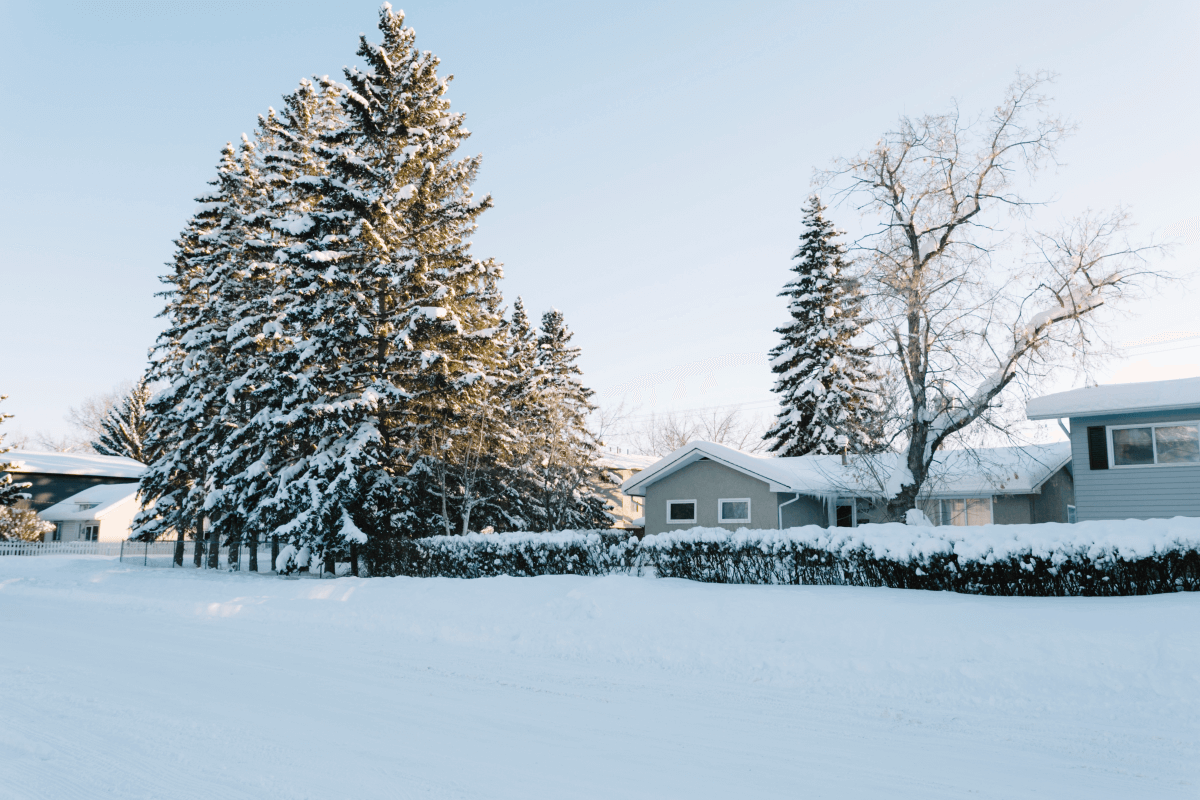Let’s face it – mobile homes are an excellent investment for most people. While this is the case, a lot goes to ensure it serves you long enough. So, there is a need to ensure that you keep it in top shape. One way you can achieve this is by protecting it from the harsh winter weather.
Now, winter is around the corner, and you can bet that you are not ready to deal with all the cold that comes with it. All you want to have during this time is a sage and warm mobile home. This means taking necessary precautions on your mobile home to ensure a comfortable wintertime. Also, such precautious steps will prevent damage that occurs during this period.
In this guide, we explore simple yet essential tips to protect your mobile home from the harsh winter weather. This way, you are guaranteed a safe and cozy stay at your home throughout the season. So, let’s get started.
Importance of Winterizing Mobile Homes
The first step to preparing your mobile home for colder months is by winterizing it. This step helps protect your home from damage that the harsh weather will cause and will also help keep the energy bills low.
As you focus on winterizing your home, you want to trap as much heat as possible. So, here is a comprehensive overview of why you should winterize your mobile home:
Prevents Plumbing Issues
One of the primary reasons why you should consider winterizing your mobile home is to prevent plumbing issues. Well, during this time, you will have significant problems with your plumbing system. From pipes freezing to blocked drains and faucets, it’s certainly a lot!
Freezing pipes, which occur most of the winter, will undoubtedly lead to popes bursting, which can cause significant water damage. As a mobile homeowner, you are more susceptible to such issues since the plumbing system is not usually deeply embedded or insulated against external temperatures.
Ensures Energy Efficiency
During the winterizing process, you will need to insulate the walls, seal gaps in the houses, and ensure that the windows and doors are airtight. By doing this, the cold war will not enter the house, and you will be trapped in warm air.
This winterizing step ensures that you do not overuse the heating systems; therefore, you save on energy. This, in return, helps you save on costs, which are usually on the high end during cold months.
Mobile Home Systems Serve You Long Enough
Winterizing your mobile home will ensure that your home systems, such as your home heating system and water heater, do not go through much undue stress. When the heating system operates effortlessly, then you can be sure that it will last you long.
By winterizing your mobile home, you are sure your home systems will remain in good working condition for ages. Therefore, you won’t have to worry about repair or replacement costs.
Ensures You Live in a Comfortable Home
Nothing pleases people more than having a comfortable living space. Winterizing your mobile home will ensure that you have a comfortable living environment. This is achieved since there will be no temperature fluctuations, no cold spots, and any other thing that will make your home uncomfortable to live in.
As winter approaches, aim to have a consistently warm environment that will ensure your well-being is taken care of.
Protects Personal Belongings
Another reason why winterizing your mobile home is important is to ensure the safety of your personal belongings. The cold and damp atmosphere is unsuitable for electronics, furniture, and personal belongings.
Also, during winter, condensation is most likely to form, which can cause the growth of mold and mildew. Winterizing ensures your mobile home remains warm and dry, therefore protecting your personal belongings from damage, and of course, they will last long.
Tips to Winterize Mobile Homes
To my mobile home owner, there are various winterizing techniques you can take that will ensure you a livable home during winter. Such include:
Inspecting and Sealing Windows and Doors
You already know that doors and windows are the major entry points for cold air in mobile homes. Therefore, the first step to winterize your mobile home is to closely inspect windows and doors.
You need to look out for gaps, damaged seals, and cracks in the windows and doors. Then, seal them off. Caulk or weather stripping is one such item you can use to seal the gaps in your mobile home’s windows and doors. Weatherstripping, for instance, works perfectly well for doors and window sashes, therefore giving you a tight seal when closing. Caulk works well when used on stationery gaps and cracks.
By identifying and sealing the windows and doors, you are sure that the cold will be kept out during winter. This way, your house will be warm without having to break the bank for more heating bills.
Insulating Walls, Floor, and Ceilings
If you want to save on energy bills on your mobile home during winter, you might want to insulate the walls, floor, and ceilings. Typically, most mobile homes lack enough insulation, and some have none at all. In most mobile homes, the insulation is about 1 inch, meaning that most of the heat ends up leaking out, so it goes to waste.
If you already have insulation in your mobile home, consider adding some extra. Doing so ensures that your pipes do not freeze.
The walls, floors, and ceilings should be your number one priority when it comes to insulation. One way you can insulate these areas is by cutting the wall at the bottom and adding an insulation sheet.
Also, you can insulate the walls, floor, and ceilings by cutting a small hole in each of the areas and adding fiberglass insulation. This way, your home will be able to retain heat, making it good to go during winter.
Protecting Plumbing and Water Lines
Another winterizing step you should take on your mobile home to prepare it for winter is to protect your water lines and plumbing systems. During winter, temperatures dramatically drop, therefore causing the water in your plumbing system to freeze.
If you have a mobile home, the risk is definitely higher since the plumbing system is usually found close to the exterior, meaning that it is more exposed to the cold. Excess cold makes water freeze, making it expand, and this can lead to pipes bursting. Well, we all know that repairing such is an expensive affair, and you have to deal with potential water damage.
This calls for plumbing and water line protection. You can achieve this by wrapping exposed pipes with foam insulation. This adds an extra layer to the lines, protecting them against cold. Also, you will want to drain the hoses and other external water sources. Leaving them with water will make them freeze during winter.
Preparing the Heating System
One of the most crucial steps to take to get your home ready for winter is getting your heating system ready. Without this, your home cannot be as livable and comfortable as you want it to be.
Clean the furnace filters to prepare your heating system for winter. This is because when clogged, the furnace restricts airflow, therefore reducing its efficiency.
Also, you need to check your furnace for any signs of wear and tear or damage.Inspect the vents and heaters for potential damage. They should not be obstructed by furniture or any other thing that can pose a fire hazard to them. Moreover, such obstructions can prevent the warm air from circulating freely, which is what you need during winter.
Some mobile homes utilize space heaters to bring in warmth. If this is the case, make sure that it is in top shape before winter sets in. Another important thing you should remember is to insulate the heating ducts as they prevent warmth if efficiently circulated in your mobile home.
Now, while you can take all these steps alone, it would be wise to hire a professional to ensure your heating system is ready for the oncoming winter. This way, you will have a comfortable and warm stay without high energy bills during the period.
Managing Humidity and Condensation
Dampness can cause so much damage to your mobile homes. Therefore, you need to avoid it at all costs, and If it happens, deduce ways to combat it. Maintaining the right humidity at your home is vital to avoid condensation issues.
When the humidity is too much, moisture can build up in your home’s windows and walls. This can, in return, cause mold and mildew growth. So, how do you manage this issue?
Well, if you don’t have a dehumidifier yet, then it’s time to get one before winter kicks in! Place in areas prone to moisture, such as bathrooms and the kitchen. Also, ensure that you empty the dehumidifier regularly.
Also, you need to ensure that your mobile home has enough ventilation. You can achieve this by using exhaust fans when cooking and showering, as they reduce humidity. Additionally, If you see any condensation on the windows and mirrors, then wipe it off to avoid water damage.
Also, you might want to use weather stripping on doors and windows. These help to keep cold air out and warm air in the house and minimize the chance of condensation forming.
Deducing ways to manage the humidity and condensation will help ensure you have a comfy and healthy living space during the winter months.
Roof Maintenance and Snow Removal
Your mobile home roof can be a bit brittle. Therefore, it is crucial to check it before winter hits. Like any other roof, it can damage and develop weak spots, leading to leakages as the snow melts.
Now, before winter, you should inspect the roofs for any wear and tear signs or damage. If there are any holes, seal them, and if the roofs are too damaged, replace them.
Another problem you will face during winter is snow accumulating on the roofs. When it’s a lot, it places so much stress on your mobile home’s structure. Therefore, it is essential to clear the snow off the roof using a long roof rake.
Keeping your mobile home roof in great shape and removing snow from it prevents structural issues and potential leakages. Your home will stay warm and dry during winter, which is the goal of everyone.
Emergency Preparedness
After all is said and done, we cannot overlook potential emergencies that might happen. You might be so ready for winter, but you never know what setback might happen.
For instance, power outages. Well, this is something that happens frequently during winter, and you need to be ready for it. How? You may ask! Well, first things first, ensure that if you are not using an electronic item, then unplug it to avoid high energy bills.
Also, have a carbon monoxide detector with you. Ensure that their batteries are working well.
Then, you will want to have a basic emergency kit at hand. It should have items such as bottled water, blankets, non-perishable food items, and any other items that might be deemed necessary during this time.
Additionally, you need to know the location of essential items, such as gas and electrical shutoffs, in case you need to access them quickly. Do not forget to have emergency contacts in case you need help. Preparing yourself for the unknown during winter will ensure that you properly deal with unexpected challenges.
Conclusion
As you await the chilly and cold months in your mobile home, you need to ensure that everything is in check. From draining water lines and repairing the roof to repairing the heating system and getting a humidifier, it’s a lot; however very worth it during such months — Trust Manufactured Housing Consultants, the experts in mobile living, for top-notch guidance during the process. Contact us today for a winter-ready home!




